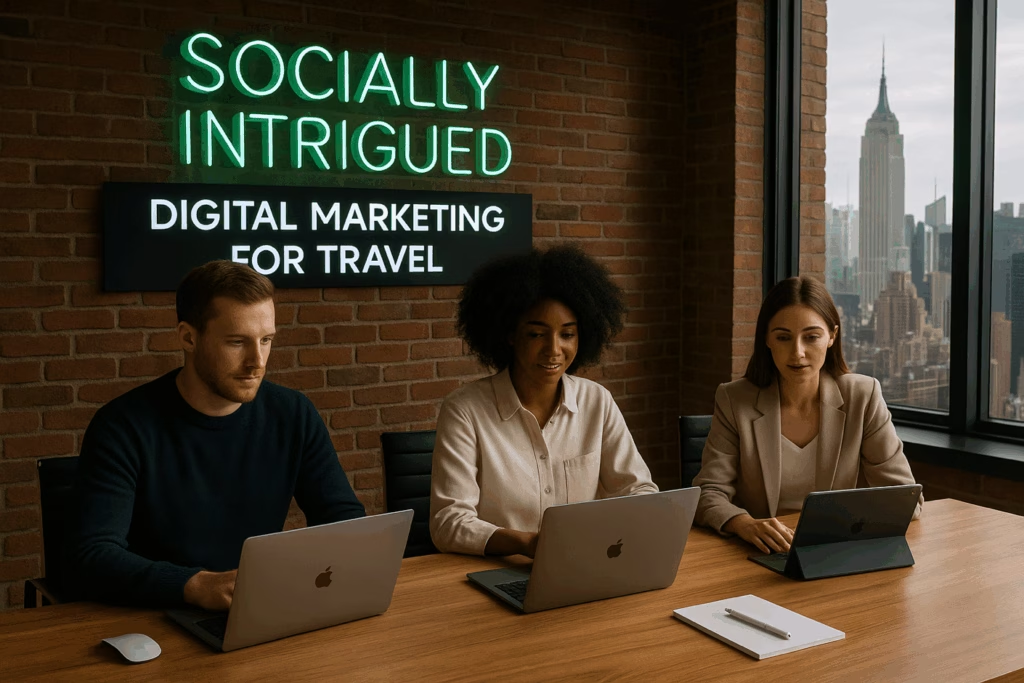Digital Marketing for Travel Companies: Complete 2025 Strategy Guide
Here’s what I’ve learned after working with dozens of travel brands: successful digital marketing for travel companies isn’t about fancy tools or big budgets. It’s about understanding that today’s travelers start their journey on a phone at 11 PM, scrolling through Instagram, dreaming of their next escape.
The numbers back this up. Travel companies are spending $6.79 billion on digital advertising this year alone, with growth hitting 14.3%. But here’s the thing most travel marketing agencies miss: spending more doesn’t guarantee better results.
This guide breaks down exactly what’s working in 2025 for digital marketing for travel companies that are actually winning customers (not just getting likes). Whether you’re running a small travel agency or managing marketing for a major resort chain, these travel and tourism marketing strategies will help you connect with travelers when and where they’re actually making decisions.

Why Most Digital Marketing for Travel Companies Fails (And What Actually Works)
I’ll be straight with you: most digital marketing for travel industry campaigns fail because they’re still stuck in 2019. Travel brands are creating beautiful brochures for a world where people book trips on their phones while waiting for coffee.
Google’s research shows that over 60% of travelers now consider last-minute trips based on good deals. Mobile searches for “tonight” and “today” travel have jumped 150% in just two years. Think about that: people aren’t planning six months ahead anymore. They’re booking this week for next week.
Reality Check: The old model of 6-month booking windows is dead. Today’s travelers book international flights with less than 50 days notice (compared to the 70-day global average). Your travel marketing agency strategy needs to capture impulse decisions, not just long-term planners.
What Changed Everything
Travel search volume grew 8.84% last year, which sounds good until you realize where that growth is happening. It’s not people researching “best time to visit Europe.” It’s people searching “flights to Barcelona tomorrow” and “hotels near me tonight.”
Meanwhile, 79% of travelers are booking everything on their phones. Not browsing on mobile and booking on desktop. Actually completing the entire purchase on a 6-inch screen. If your booking process takes more than three taps, you’re losing customers to competitors who get it.
The smartest travel and tourism marketing agencies have figured this out. They’re not just making mobile-friendly websites. They’re redesigning the entire customer experience around the reality that travel planning happens in micro-moments between everything else in people’s lives.
Essential Digital Marketing for Travel Companies: Two Proven Strategies
After analyzing what’s working for our most successful clients, two approaches consistently outperform everything else in digital marketing for travel companies. These aren’t theoretical best practices, they’re proven strategies that drive real revenue.
Strategy 1: AI That Actually Helps (Not Just Impresses)
Everyone’s talking about AI in digital marketing for travel companies, but most implementations are just chatbots that frustrate customers. The brands winning with AI are using it to solve real problems, not show off technology.
Here’s what actually works:
- Smart Content Matching: Instead of showing everyone the same “popular destinations,” AI analyzes browsing patterns to surface relevant options. Someone looking at adventure travel in January gets different suggestions than someone browsing luxury resorts in July. This isn’t rocket science, but most travel marketing companies still show generic content to everyone.
- Timing Intelligence: The best systems learn when individual users are most likely to book and time outreach accordingly. Send that email at 2 PM on Tuesday for one customer, 8 PM on Sunday for another. Conversion rates can double with proper timing.
- Conversation AI That Actually Understands: Advanced chatbots that can handle complex requests like “family-friendly resort in Costa Rica with kids’ programs and adults-only areas” without passing customers to human agents. This level of travel industry digital marketing automation saves time and improves satisfaction.
The key insight? Personalization reduces decision fatigue. When travelers see content that matches their exact situation and preferences, they move faster through the booking process. We’ve seen conversion rate improvements of 15-25% when this is implemented correctly.
Strategy 2: Video Content That Converts (Not Just Entertains)
Video has the highest ROI in 2025, but not because it’s pretty. It works because it answers the question every traveler has: “What’s it really like?”
The most effective travel marketing agency video strategies focus on three types of content:
- Experience Previews: 30-second clips that show what a day actually looks like at your destination. Not drone shots of empty beaches, but real families enjoying activities, couples dining, groups laughing. The goal is helping viewers picture themselves there.
- Social Proof in Action: User-generated content from real customers beats professional footage every time. A shaky iPhone video of someone’s actual vacation creates more trust than a $50,000 commercial.
- Problem-Solving Content: Quick videos answering common questions like “What to pack for Iceland in March” or “How to get from the airport to your hotel in Bangkok.” This positions your brand as helpful, not just promotional.
Smart brands create content series that tell ongoing stories. Instead of one-off promotional videos, they develop narrative arcs that keep audiences engaged across multiple touchpoints. This builds familiarity and keeps your company top-of-mind during those extended planning cycles.
The Technology Revolution Reshaping Travel Marketing
Mobile-First Isn’t Enough Anymore
With mobile devices driving over 80% of travel research and bookings, saying you’re “mobile-friendly” is like saying you accept credit cards. It’s not a competitive advantage, it’s table stakes.
The travel brands winning in 2025 are building mobile-only experiences:
- Progressive Web Apps: These feel like native apps but work in any browser. They load instantly, work offline, and can send push notifications. Perfect for travelers dealing with spotty connectivity.
- Location-Based Everything: When someone’s standing outside a competitor’s hotel, that’s when you want to reach them with your better offer. Geo-targeted ads and content that activate based on real-world location.
- One-Tap Booking: If your checkout process requires creating an account, entering credit card details, and confirming through email, you’re losing customers to apps that book with a fingerprint.
Voice Search Is Changing How People Discover Travel
People aren’t typing “cheap flights” anymore. They’re asking Alexa, “What’s the weather like in Tuscany in April?” and “Find me a hotel near the Louvre with good reviews.”
The smartest travel and tourism marketing teams are optimizing for these conversational queries. Instead of targeting “Japan travel,” they’re focusing on “best time to visit Japan for cherry blossoms” and “how much does a trip to Japan cost for two people.”
This shift toward natural language search means your content needs to answer actual questions, not just include keywords. The brands dominating voice search are creating content that directly addresses what people are asking their devices.
Content Marketing for Travel Companies That Actually Converts
The Psychology Behind Travel Content
Successful digital marketing for travel companies taps into specific emotions: the desire for escape, adventure, connection, and transformation. But here’s what most marketers miss: people don’t book destinations, they book feelings.
The content that converts best addresses these core motivations:
- Story Over Specs: Nobody books a hotel because it has “marble bathrooms and 400-thread-count sheets.” They book because they can imagine waking up refreshed and starting their day perfectly. Tell the story of the experience, not the features of the room.
- Problem-Solving Over Promotion: The most valuable content answers real travel challenges. “How to visit Paris on a budget with kids” gets more engagement and drives more bookings than “Why Paris is amazing.” Solve problems and customers will trust you with their vacation.
- Seasonal Relevance: Align your content with natural planning cycles. Start promoting summer destinations in February when people are dreaming of escape, not in June when they’ve already booked.
Email’s Surprising Comeback in Travel Marketing
Despite all the talk about new channels, email still delivers $36-40 for every dollar spent, especially in travel. The difference is in how it’s being used now.
The travel marketing agencies getting the best results from email use behavioral segmentation, not demographic targeting:
Pro Insight: A business traveler who books monthly has completely different needs than a family planning their annual vacation, even if they’re the same age and income. Segment by travel behavior, not demographics.
Smart email strategies include:
- Timing-Based Automation: Sending destination inspiration 8-12 weeks before typical booking windows for that market
- Abandonment Recovery: Following up on incomplete bookings with simplified checkout processes
- Post-Trip Engagement: Converting one-time customers into repeat bookers with personalized recommendations
Measuring What Actually Matters
Beyond Vanity Metrics
I’ve seen too many travel brands obsess over Instagram likes while their booking conversion rates stay flat. The metrics that actually drive business growth are different in travel:
- Booking Conversion Rate by Source: Which channels convert browsers into actual customers? Social media might drive awareness, but Google might drive bookings.
- Average Booking Value: A channel that brings fewer visitors but higher-value bookings often performs better than high-traffic, low-value sources.
- Customer Lifetime Value: The customer who books once vs. the customer who becomes a repeat booker. Understanding this helps you calculate how much you can spend to acquire different types of customers.
- Assisted Conversions: Travel purchases involve multiple touchpoints. Someone might see your Instagram ad, visit your website, get your email, and then book. Traditional analytics miss this complexity.
Attribution for Complex Travel Journeys
Travel purchases are complicated. People research for weeks, compare dozens of options, and touch multiple channels before booking. Simple “last-click” attribution completely misses how travel decisions actually happen.
The most successful travel brands use attribution models that account for the full customer journey, including social proof, seasonal factors, and external influences like weather or travel advisories.
What’s Coming Next in Travel Marketing
Sustainability as a Competitive Advantage
Environmental consciousness isn’t just a nice-to-have anymore, especially with younger travelers. The travel companies authentically embracing sustainability (not just talking about it) are gaining real competitive advantages.
Effective sustainable travel industry marketing includes:
- Carbon Integration: Making environmental impact reduction part of the booking process, not an afterthought
- Local Impact Stories: Showing how travel spending supports communities and preserves culture
- Verified Partnerships: Working with genuinely sustainable accommodations backed by real certifications, not just marketing claims
Influencer Marketing Gets Real
Travel influencer marketing is evolving beyond basic sponsored posts. The partnerships that actually drive bookings now involve long-term relationships with creators who genuinely align with brand values.
Micro-influencers (10K-100K followers) often deliver better ROI than mega-influencers because their audiences trust their recommendations more. These creators can showcase specific niches – luxury family travel, budget backpacking, accessible tourism – that resonate with precise target markets.
How Socially Intrigued Approaches Travel Marketing
Look, every agency claims they “understand travel marketing.” But most are applying general digital marketing tactics to travel brands and wondering why results are mediocre.
Our approach is different because we started with the insight that travel purchases are emotional decisions justified with logic. People don’t book the cheapest option or the one with the most features. They book the one that makes them feel something.
Our digital marketing services for travel companies include:
- Behavioral Personalization Systems: Technology that delivers relevant content based on actual travel preferences, not just demographics
- Mobile-First Experience Design: Websites and booking flows built specifically for the mobile-centric travel planning process
- Content That Converts: Visual storytelling that inspires action while building brand authority in your specific travel niche
- Performance-Driven Advertising: Paid campaigns across Google, Facebook, Instagram, and TikTok that focus on bookings, not just awareness
- Search Optimization for Travel: SEO and voice search strategies that capture high-intent travelers at every stage of planning
Real Results for Real Travel Brands
We recently worked with a boutique adventure travel company that was struggling to compete with larger operators. Through a combination of mobile optimization, targeted social advertising, and content that showcased real customer experiences, they increased online bookings by 340% in eight months.
The key wasn’t spending more on advertising. It was understanding that their customers weren’t just booking trips, they were investing in personal transformation. Once we aligned their marketing with that insight, everything clicked.
Another client, a destination marketing organization, saw a 225% increase in qualified leads after we implemented behavioral targeting that served different content to adventure seekers, luxury travelers, and family vacation planners. Same budget, much smarter approach.
The Future Belongs to Brands That Understand Travelers
The travel industry’s digital transformation is speeding up, not slowing down. Virtual reality previews, blockchain loyalty programs, and augmented reality experiences are moving from experimental to expected.
But here’s what won’t change: people will always want authentic experiences and genuine connections. The travel companies that balance technological sophistication with human insight will dominate the next decade.
Your Next Steps
Ready to stop blending in with every other travel brand? Here’s where to start:
- Audit Your Mobile Experience Today: Go through your entire booking process on your phone. If anything feels clunky, fix it. You’re losing customers every day it stays broken.
- Start With Simple Personalization: Begin showing different content based on user location and referral source. Build from there as you learn what works.
- Create Video Content This Week: Start with authentic customer testimonials, not expensive production. Authenticity beats polish every time.
- Optimize for Questions, Not Keywords: Update your content to answer the actual questions people ask about your destinations.
- Focus on Bookings, Not Metrics: Track conversion rates and customer value, not just traffic and social media engagement.
Stop Competing on Price. Start Winning on Experience.
While your competitors are still figuring out last year’s trends, you could be implementing the strategies that will dominate 2025 and beyond.
Socially Intrigued doesn’t just run ads and hope for the best. We build comprehensive digital marketing for travel companies strategies that turn dreamers into bookers and one-time customers into lifelong advocates.
See How We Help Travel Brands Win
Ready to outrank your competition? Let’s talk strategy.

